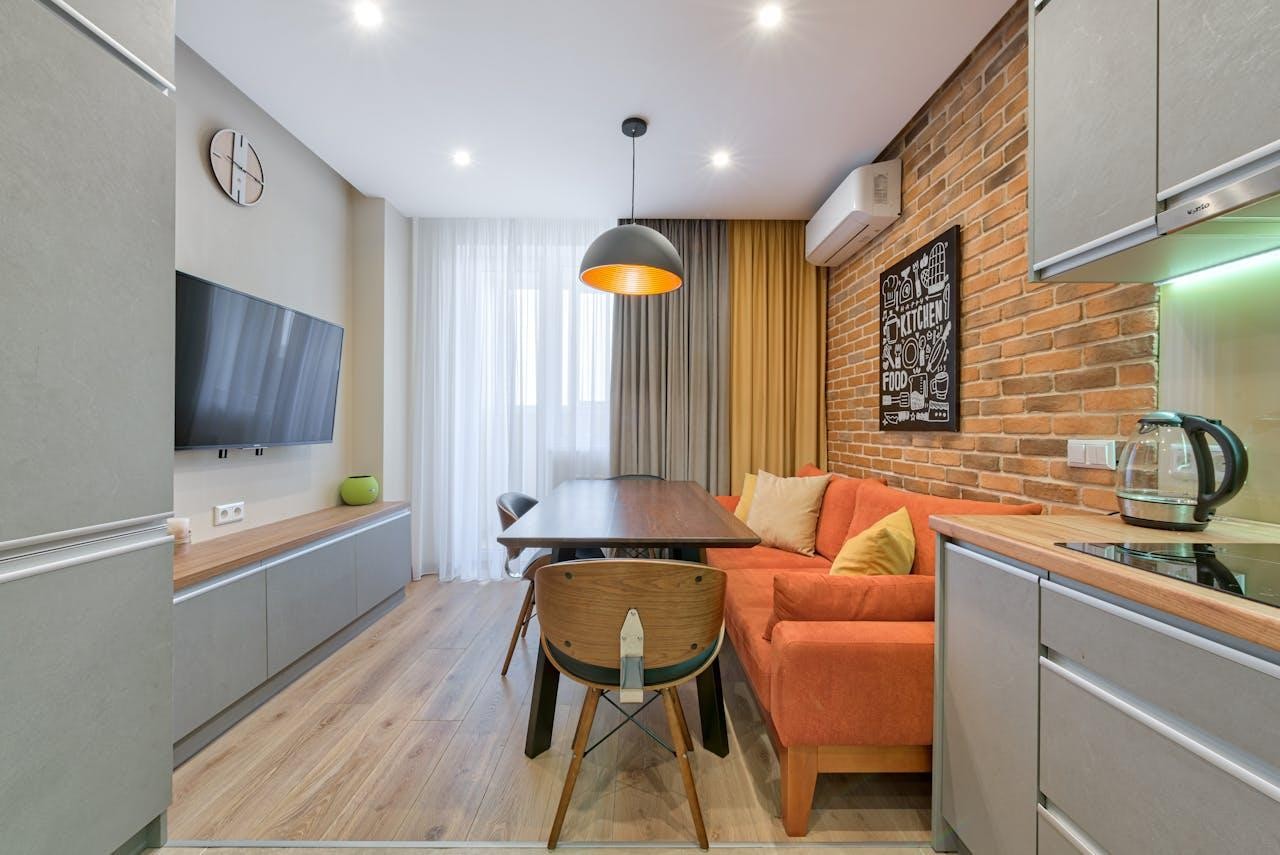Photos from Pexels.com.
Pros and Cons of Moving to a Smaller Home
The decision to downsize is not one to take lightly. While moving to a smaller home can provide financial relief, reduced maintenance, and a more manageable lifestyle, it also comes with limitations that may not suit everyone. Some people find a fresh start in a new space liberating, embracing a more minimalist way of living, while others struggle with the emotional challenge of letting go of a larger space filled with memories. The pros and cons of moving to a smaller home should be carefully evaluated to determine whether it aligns with your long-term goals, lifestyle needs, and personal circumstances. This guide will walk you through the benefits and drawbacks of downsizing and help you decide if it’s the right move for you.
Benefits of Moving to a Smaller Home: Lower Costs
One of the most compelling reasons to downsize is the potential for cost savings. A smaller home generally means a lower mortgage or rent, reduced property taxes, and decreased utility bills. Heating, cooling, and general maintenance costs are typically lower, which can free up money for travel, investments, or hobbies. For retirees or those planning for financial security, these savings can be a game-changer. Downsizing can also eliminate the need for expensive home repairs that often come with larger properties, such as roof replacements, extensive landscaping, and high-cost utility repairs. By moving to a smaller home, homeowners can redirect funds toward experiences rather than expenses.
Note: If you have a mortgage and expect to have one in your new home, keep in mind that interest rates will likely be significantly higher than on your current loan.
Less Maintenance
A smaller home means fewer rooms to clean, less outdoor maintenance, and a more simplified living experience. Tasks such as vacuuming, dusting, and maintaining multiple bathrooms become much easier when living in a compact space. With reduced home maintenance, you can spend more time on activities you enjoy, whether it’s traveling, pursuing hobbies, or simply relaxing. This is particularly beneficial for those who lead busy lives or are approaching retirement and prefer to minimize household responsibilities. Additionally, senior downsizing reduces the burden of home repairs, such as fixing leaky roofs or repainting large spaces.
A More Simplified and Organized Lifestyle
Living in a smaller home encourages a shift toward a more intentional and clutter-free lifestyle. With less space to fill, people become more selective about what they keep, focusing on essentials rather than accumulating unnecessary belongings. This shift can lead to a more peaceful and stress-free living environment. Clutter can cause anxiety and overwhelm, and a smaller home naturally limits the amount of unnecessary items people hold onto. Many people who downsize find themselves prioritizing quality over quantity, choosing to invest in multi-functional furniture and creative storage solutions rather than accumulating excessive possessions.

Environmental Benefits
Smaller homes have a lower carbon footprint. Less square footage means less energy is required for heating, cooling, and lighting, which reduces overall energy consumption. Many downsizers find they can embrace a more eco-friendly lifestyle simply by living in a more efficient space. Additionally, smaller homes often encourage people to adopt sustainable habits such as composting, reducing waste, and making more thoughtful purchasing decisions. With lower energy costs and less material consumption, downsizing is an excellent option for individuals who prioritize sustainability.
Access to More Desirable Locations
Moving to a smaller home can sometimes open doors to more desirable neighborhoods that may have been financially out of reach before. City centers, beach communities, or retirement-friendly locations often come with higher living costs, but opting for a smaller residence can make them more affordable. Many people who downsize find they can move closer to family, entertainment hubs, or workplaces, enhancing their quality of life.
How to Decide If Downsizing Is Right for You
● Evaluate Your Financial Goals: Consider whether downsizing aligns with your financial plans.
● Assess Your Space Needs: If you have rooms that go unused in your current home, a smaller home may be a more practical choice.
● Research Housing Options: It is in vain to weigh pros and cons of moving to a smaller home if you can’t find a proper housing option.
How To Downsize and Declutter?
Downsizing is an opportunity to reevaluate your possessions and eliminate unnecessary clutter. To ease your transition simply declutter before the move to ensure that the new home remains functional. Here are some steps to make the process easier:
● Sort belongings into categories: Keep, donate, sell, and discard.
● Start with non-sentimental items: Begin with clothing, kitchenware, and household goods before tackling sentimental items.
● Measure your new space: Ensure that furniture and storage solutions will fit before moving.
● Sell or donate unused items: Many organizations accept donations, and selling valuable items can help offset moving costs.
● Digitize important documents and photos: Reduce paper clutter by storing files electronically.

Challenges of Moving to a Smaller Home
One of the most significant downsides to downsizing is the reduced storage space. Larger homes often come with basements, attics, or spare rooms where homeowners can store holiday decorations, sentimental keepsakes, and excess furniture. In a smaller home, every square foot counts, which means fewer places to store items that are not used regularly. To overcome this challenge, homeowners must invest in smart storage solutions such as wall-mounted shelves, under-bed storage, and compact furniture with built-in compartments. Without effective storage strategies, a smaller home can quickly become cluttered. Make sure every room is organized and optimally used.
Emotional Adjustments
Moving out of a larger home, especially one filled with years of memories, can be emotionally challenging. Many people feel an attachment to their homes, associating them with important life milestones, family gatherings, and sentimental possessions. Downsizing may require letting go of furniture, decorations, or heirlooms that no longer fit in the new space. This emotional transition can be difficult, especially for those who have lived in the same home for decades. However, shifting the focus toward the benefits of a smaller, more manageable home can make the transition easier.
Hosting Limitations
If you enjoy hosting large gatherings, downsizing may present some challenges. Smaller homes often have limited seating and fewer guest bedrooms, making it harder to entertain family and friends. Those who frequently host overnight guests may need to consider alternative sleeping arrangements, such as sofa beds or inflatable mattresses. Outdoor spaces, community rooms, or nearby event venues can help accommodate social gatherings, but hosting may still require more creativity in a smaller living space.
Resale Value Considerations
While smaller homes are often in demand, they may not appreciate in value as quickly as larger properties. If long-term real estate investment is a priority, it’s important to research the market before making a decision. Factors such as location, housing demand, and property size can all influence resale potential. Some downsizers opt for condominiums or townhomes in prime locations to maintain investment value while still enjoying the benefits of a smaller space.

Conclusion: Pros and Cons of Moving to a Smaller Home
The pros and cons of moving to a smaller home should be carefully considered before making a decision. Downsizing can provide financial relief, reduced maintenance, and a more simplified lifestyle. However, it also comes with challenges, such as limited storage and emotional adjustments. Understanding your financial situation, space requirements, and long-term goals will help you determine whether downsizing is the right move for you. By preparing ahead and embracing the benefits of a smaller space, homeowners can make a smooth and rewarding transition.






